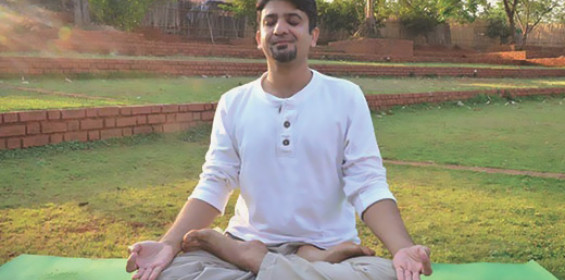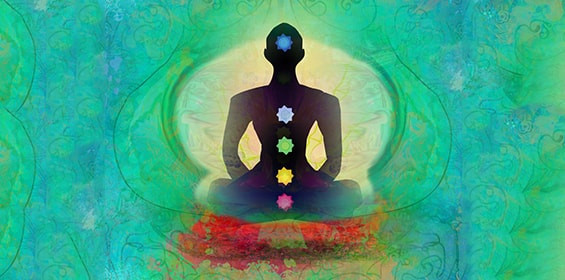Meditation, simply put, is a delicate art of doing nothing. Throughout the busy, chaotic reality of our regular days, meditation gives us a much-needed pause to sit in stillness and silence, so that we can get in touch with our real, beautiful, and blissful self. There are many forms of meditation, from individual practice to a large mass meditation practice, but the ultimate goal of each is a feeling of relaxation and inner peace.
According to the World Health Organization (WHO), mental illness affects an estimated 350 million people around the world. Depression will be the second-highest cause of disease in middle-income countries and the third highest in low-income countries by 2030. Statistics reveal that 26 percent of the population in the United States has some kind of mental illness, and 25 percent of Europe is suffering from depression or anxiety.
Join a Free workshop on Yoga, Meditation and Breath
These statistics are alarming, but the good news is that meditation can be a very effective tool to manage mental illness. A growing body of research supports the role of meditation in enhancing your mental health. With new studies coming out just about every week, the benefits of meditation set forth by ancient yogis are beginning to be supported by medical technologies like MRIs and EEGs, proving the effects of meditation on improving your mental health, changing your brain, and even affecting your genes.
Meditation for managing negative emotions
When we look at the state of society, it’s clear that we are experiencing the physical, emotional, mental, and social repercussions of sustained stress. Multitasking has become a way of life, resulting in many stress-related emotions like anxiety, depression, anger, fear, and insecurity. Research suggests, however, that practicing meditation can help with managing these negative emotions.
Meditation to relieve late-life depression:
A study recently published in the British Journal of Psychiatry found that 83 seniors who practiced Sahaj Samadhi meditation for 20 minutes a day for three months found a significant reduction in late-life depression. Depression affects approximately 300,000 older adults in Canada, while one in 4 older adults suffers from depressive symptoms that cause distress and functional impairment in the USA.
Meditation to manage anxiety disorders:
Another study, published in April 2018 in the journal Psychiatry Review, found that individuals with a generalized anxiety disorder who participated in a Mindfulness-Based Stress Reduction program had a greater reduction in stress markers than a control group.
Meditation to cope with anger and frustration:
A small study published in February 2016 in the Journal Consciousness and Cognition found that just one session of meditation reduces physiological indices of anger in both experienced and novice meditators.
For this study, researchers examined 15 people who were new to meditation and 12 who were experienced practitioners. The participants were asked to relive experiences that made them angry. Those who had never practiced meditation before experienced an increase in heart rate, blood pressure, and breathing rate, while those with experience in the practice did not have much of a physical reaction to the exercise.
As a second part of the experiment, those who had never meditated before did so for 20 minutes. When asked to relive the anger-inducing episode once more, they had much less of a physical response.
Meditation to reduce fears and phobias:
Regular practice of meditation helps you process irrational fears and phobias through its effect on the amygdala and ventrolateral prefrontal cortex of the brain.
Meditation to de-stress:
One of the most famous and well-researched benefits of meditation is reduced stress. Taking just a few minutes to meditate, taking care of your mind, body, and spirit, allows you to quickly de-stress and become more happy and energetic.
Meditation for weight loss:
A 2014 research investigated mindfulness meditation in a group and individual settings and explored the potential impact on weight loss and other factors (i.e. mindfulness, impulsivity, and avoidance) that may assist or hinder weight loss. Results indicated that participants in the group setting lost weight and lowered their levels of cognitive-behavioral avoidance.
Getting started with meditation
Like any exercise routine or sport, meditation takes practice! No one in the world has “extra time”, but if you make the commitment, you can always find 10 minutes in your day to meditate. You don’t need the perfect moment or the perfect location. Create your own space and just show up like you would for any other appointment. Make it a non-negotiable practice.
For the best results, it’s recommended to learn meditation under the guidance of an expert, and to meditate every day, first thing in the morning. However, you can start with these easy steps to meditate on your own for just 5 minutes:
Find a comfortable position, either sitting on the floor, chair, or at your desk. Place your feet firmly on the floor, or sit cross-legged. Allow your body to loosen up and start relaxing. Soften your facial muscles, neck, and shoulders. Keep your back straight but not stiff, your hands free, and your eyes gently closed.
Breathe in with a gentle smile, deeply and evenly, for a count of 4 through your nose. Slowly breathe out through the nose for a count of 4. As you inhale, feel the air from your breath reach every part of your body. Follow your breath.
Repeat this for 3 breaths, without force, focusing on the inhale and exhale. For the next 3 breaths, inhale for a count of 4 and exhale for a count of 6. Now let go of all your efforts, and totally relax allowing the mind to wander wherever it wants.
Your mind wandering is normal! Simply observe these wandering thoughts without judgment. Notice how you feel at the end of 5 minutes. When you feel complete, you may open your eyes.
Gradually increase your meditation time to 10-20 minutes once you are comfortable with the process.
Alternatively, you may also try one of these Guided Meditations.
Find a buddy or meditate in a group setting
There is a power in the group (Buddha called it sangha). If you’re finding it difficult to meditate alone, find a buddy or join meditation meetups or events.
Take charge of your mental health
"The quality of our life depends on the quality of our mind," says Gurudev Sri Sri Ravi Shankar, a renowned meditation expert. We can't control what happens on the outside, but we do have a say over the quality of our mind and our mental health. No matter what's going on, if your mind is ok, everything is ok. Right now. In this very moment.
Make meditation part of your life, and start reaping its mental and emotional benefits. It’s said that it takes only 40 days to develop new habits. For the next 40 days, commit yourself to daily meditation, and see how drastically your mental health changes for good.
Sejal Shah, E-YRT 500 Sri Sri Yoga Teacher, YACEP, Art of Living Teacher, NYU Post Graduate Medical School approved Yoga-CME retreat facilitator, Mind-Body Wellness Writer, Homeopath












































